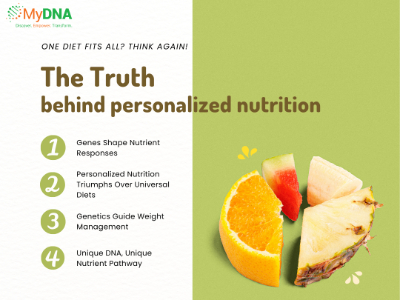
In the ever-evolving landscape of health and wellness, dietary advice seems to be everywhere. From trendy diets to well-meaning recommendations, the idea of a one-size-fits-all diet has permeated popular culture. However, the more we delve into the intricate world of genetics, the clearer it becomes that our individual genetic makeup plays a significant role in how our bodies respond to different foods. In this blog post, we will explore the concept of unique genetics and its impact on diet, debunking the myth that one universal diet can cater to the diverse needs of every individual.
Understanding Genetic Diversity:
The human genome is a marvel of complexity, comprising a vast array of genes that influence our traits, behaviors, and, importantly, our metabolism. Genetic variations are inherent, contributing to the diversity observed in how individuals process and utilize nutrients. For example, some people may metabolize carbohydrates more efficiently, while others thrive on a higher fat intake. Recognizing and embracing this diversity is key to tailoring diets that truly work for each person.
The Fallacy of One-Size-Fits-All Diets:
Despite the popularity of diets proclaiming universal benefits, such as ketogenic, paleolithic, or vegetarian, it's crucial to acknowledge that what works wonders for one person may not yield the same results for another. Genetic factors such as metabolism, insulin sensitivity, and nutrient absorption can vary significantly among individuals. This means that adhering strictly to a particular dietary regimen without considering individual genetic nuances may lead to suboptimal results or even health issues.
The Role of Nutrigenomics:
Nutrigenomics, the study of how individual genetic variations influence responses to nutrients, has shed light on the intricate relationship between genetics and diet. Through advancements in genetic testing, individuals can gain insights into their unique genetic makeup and how it may impact their nutritional needs. Understanding one's genetic predispositions allows for a more personalized approach to diet and lifestyle choices.
Tailoring Diets to Genetic Profiles:
Rather than subscribing to generic diet plans, an emerging trend in the health and wellness industry involves tailoring nutrition advice to individual genetic profiles. For instance, a person with a genetic predisposition for lactose intolerance might find a lactose-free diet more suitable, while someone with a high metabolic rate may benefit from a balanced macronutrient intake. Personalized nutrition takes into account factors such as food sensitivities, nutrient requirements, and metabolic tendencies.
In the pursuit of optimal health and wellness, recognizing and celebrating the uniqueness of our genetics is paramount. The myth of the one-size-fits-all diet is gradually giving way to a more personalized and nuanced approach to nutrition. Embracing the knowledge gleaned from nutrigenomics allows individuals to make informed dietary choices that align with their genetic predispositions, promoting not only better health but also a deeper understanding of the intricate interplay between genes and nutrition. As we navigate the ever-expanding realm of personalized health, the message is clear: our genes shape our dietary needs, and acknowledging this diversity is the key to unlocking our individual paths to well-being.